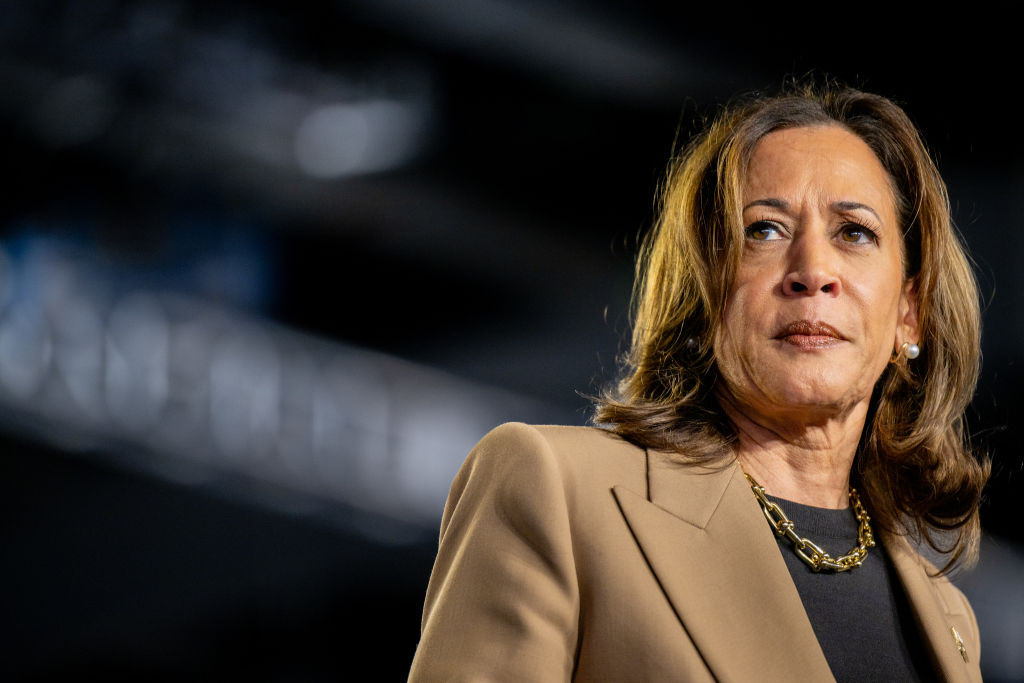Kamala Harris would serve as the avatar of an enormous anti-speech bureaucracy.
The Kamala Crackdown

Elon Musk is the only thing standing in the way of the war on “disinformation.”
Elon Musk’s acquisition of Twitter was a world-historical event. In the past two years, the eccentric billionaire transformed the most politically influential website in the world into not just a haven for free speech, but—in many instances—an explicitly right-wing platform. The seismic implications of this shift will reverberate well beyond the 2024 election. With the notable exception of Trump, Musk is arguably the single most consequential figure to have emerged in American politics over the past decade.
The people who run things in America have never forgiven him. Coordinated advertiser boycotts, spearheaded by mafioso activist groups like the ADL and the NAACP, have tried to smother Musk’s reborn platform in its crib. The Biden-Harris administration launched an all-fronts war on Musk himself, mounting an “endless barrage of regulatory, reputational and legal attacks” via “the Department of Justice, the Federal Aviation Administration, the Federal Trade Commission, the Securities and Exchange Commission, the National Labor Relations Board, the U.S. Attorney for the Southern District of New York and the U.S. Fish and Wildlife Service,” as Liz Peek wrote in The Hill last year. Across the pond, the Left’s allies in the European Union bureaucracy have sought to get in on the action, too.
Next to immigration, free speech—and in particular, free speech in the digital arena—is the battlefield of our time. America’s closest peers in the Anglosphere and mainland Europe have embraced a series of increasingly dystopian prohibitions on “hate speech,” leading to a long line of high-profile prosecutions and jailings of right-wing activists and politicians. Thus far, Americans have managed to avoid the worst of it, thanks to the exceptionally strong speech protections afforded by the First Amendment. But no one should doubt that U.S. elites are eager to follow their counterparts in the rest of the West (just ask Douglass Mackey).
Their crusade against “disinformation,” beginning in the Trump era, was an attempt to do just that. Hamstrung by the Constitution (at least for now), the American ruling class has nonetheless sought to construct a sprawling censorship regime across the internet, which has rapidly transplanted older modes of communication to become something akin to the new public square. In so doing, they have made serious headway toward an end-run around America’s constitutional framework, even as they claim to remain loyal to it.
In the digital age, “deplatforming” is a kind of un-personing for political activists; it makes it effectively impossible for them to access the public conversation. They become ghosts. Over the past few years, right-wing dissidents have been censored, shadowbanned, deplatformed, debanked, and even placed on no-fly lists in a coordinated campaign to marginalize their political views. Their free speech is “free” in name only.
Prior to 2016, Big Tech—and social media in particular—was widely viewed as a natural ally for liberal, technocratic progress. Social media and other new technologies played a huge role in Obama’s 2008 campaign and subsequent presidency, and one frequently heard progressives enthuse about Big Tech’s revolutionary “democratization” of society. (This confidence was further reinforced by the innovative use of social media in the Arab Spring in the early 2010s). Democratization, for the Left, went hand in hand with “progress”—which meant, of course, a world that looked more like what progressives thought it ought to look like.
But the glorious techno-progressive future never came. The Arab Spring didn’t lead to lasting liberal democracies in the Middle East, and instead of being a vehicle for “progress,” social media gave us Brexit, Donald Trump, and a new wave of right-wing reaction across the West. The elite Left’s pivot was swift and bitter. Obama was once “hailed as the first ‘internet president’ for his campaign’s embrace of then-nascent social media and blogs,” Politico reported earlier this year. His “rise was inextricable from that of the digital landscape we now take for granted.” But “today Obama’s techno-optimism seems almost unthinkable to the Democratic base.” The former president himself now goes on lecture circuits to talk remorsefully of how he “underestimated” online disinformation’s existential threat to democracy.
Digital democratization challenged and undermined the liberal order’s power, rather than expanding and legitimizing it. The very platforms that the managerial elites funded, backed, and hailed as the vehicles of the future have—like Frankenstein’s monster—turned against them. For the people in charge, the internet is the god that failed.
Immoderate Moderation
X (and by extension, Musk) represents one of the most serious existential threats to America’s ruling class today. The censorship-industrial complex and its ideological façade, the war on “disinformation,” represent the elite’s attempt to claw back control of the digital sphere. Musk’s X is the single greatest roadblock to their narrative hegemony. If Kamala Harris wins, it will be open season on both X and (in all likelihood) Musk himself. A Harris Administration’s persecution of political enemies would dwarf that of Biden’s, and it is not at all clear that Musk’s miraculous restoration of free speech on X will survive.
As Roger Kimball noted in his essay envisioning President Kamala’s America, the Democratic Party’s ambitions on this issue are no secret. John Kerry recently described the First Amendment as “a major block to the ability to be able to hammer [disinformation] out of existence,” and expressed his hope that Democrats would “implement change” to that arrangement if they won the election. In September, Hillary Clinton suggested that people who spread “disinformation” should be “civilly or even in some cases criminally charged.” Robert Reich, Bill Clinton’s former secretary of labor, published a piece in The Guardian this summer titled “Elon Musk is out of control. Here is how to rein him in.” Reich argued—among many other things—that “regulators around the world should threaten Musk with arrest if he doesn’t stop disseminating lies and hate on X.”
Harris herself is every bit as authoritarian on this issue as her comrades, as Kimball also shows. Perhaps sensing the rightward shift in the national mood, the Harris campaign has recalibrated somewhat and embraced a kind of how-do-you-do-fellow-chuds aesthetic, devoid of the boutique campus activist obsessions that drove the vice president’s 2019 campaign for the White House. But don’t be fooled. If Harris wins, this newfound moderation will disappear overnight, just as the pseudo-magnanimity that Biden adopted on the 2020 campaign trail evaporated on the first day of his presidency. Harris’s tenure as vice president has been characterized by an unquenchable thirst for cultural radicalism that was striking to even many of her allies. On these issues, in particular, a Harris administration will be more radical, aggressive and uncompromising than its predecessor.
If Democrats, with Harris as their vessel, win another term in the White House, it may well be a lasting and final victory. As I wrote in the American Conservative earlier this year, it has been “20 years since a Republican presidential candidate carried the popular vote; today, the party’s sole remaining path to an Electoral College majority requires mustering razor-thin margins in enough must-win states to crawl across the finish line. That path will continue to narrow due to demographic change, generational turnover tied to the unprecedented fact that young people are not becoming more conservative as they age, and the growing scope and sophistication of the Democratic Party’s ballot-harvestingand electioneering machine.”
The Democrats are vividly aware of this fact, as evinced by the Biden administration’s scrambled attempts to fast-track as many new citizenship requests as possible in the lead-up to the election. Buoyed by an ever-growing mass of loyal new voters, the Harris administration will feel more confident than ever in its efforts to squash the last remaining sites of resistance to the New America it is intent on building. Musk will be at the top of their list.
The American Mind presents a range of perspectives. Views are writers’ own and do not necessarily represent those of The Claremont Institute.
The American Mind is a publication of the Claremont Institute, a non-profit 501(c)(3) organization, dedicated to restoring the principles of the American Founding to their rightful, preeminent authority in our national life. Interested in supporting our work? Gifts to the Claremont Institute are tax-deductible.
A Harris victory would be pyrrhic.
Freedom, once lost, is lost forever.
The dire consequences of a stolen election.




